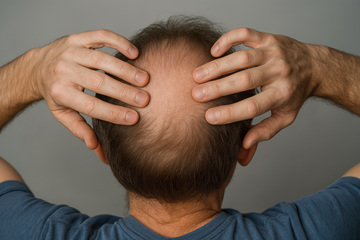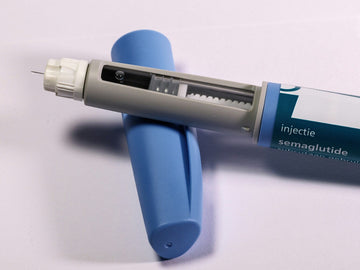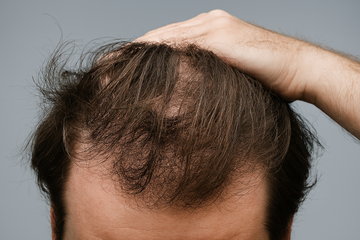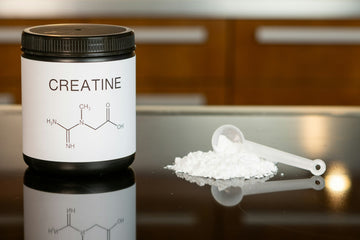What Medications Cause Hair Loss as a Side Effect

Marinella Helera • Jul 07, 2025
Ever start a new medication and then notice more hair in the shower or on your pillow? You're not imagining it – some medications can cause hair loss (also called medication-induced hair loss).
There are two primary mechanisms behind this kind of hair loss. The first is telogen effluvium, where medications push hair follicles into a resting phase prematurely and lead to noticeable shedding about three months later. The second is anagen effluvium – a more rapid type of hair loss where drugs disrupt hair in its active growth phase.
This issue is more common than many realize. From acne treatments to heart medications, a wide range of drugs can unexpectedly affect your hair. For men, hair loss isn't only cosmetic; it can impact confidence and mental well-being.
This article will help you explore what medications cause hair loss and what you can do about it.
Overview of Drug Classes
There are various medications that cause hair loss through different biological mechanisms. Some cause the body to push hairs into a resting or shedding state, while others directly damage hair follicles during growth.
That said, here are the most common culprits, how they cause hair loss, typical duration, and more.
Chemotherapy
Chemotherapy is well known for causing significant hair loss. This occurs through anagen effluvium – a phase in which hair falls out rapidly during the active growth phase.
It is because chemo drugs, such as doxorubicin, cyclophosphamide, and paclitaxel, are designed to kill fast-dividing cells, cancerous or not. Since hair follicles are among the fastest-growing cells in the body, they're also targeted during these treatments.
Hair loss typically starts within days or weeks of the first cycle. It can affect not just the scalp but also the eyebrows, eyelashes, and body hair.
Fortunately, hair usually begins to regrow 3-6 months after treatment ends, with most people seeing regrowth within 6–12 months.
Retinoids
Retinoids, such as isotretinoin (Accutane), are commonly prescribed for severe acne. They can lead to telogen effluvium, often in a dose-dependent manner. This means the higher the dose, the more likely you are to notice hair shedding.
Hair loss from retinoids usually becomes noticeable 2 to 3 months after starting the medication. If you stop the drug or lower the dose under your doctor's guidance, hair growth typically resumes over the next few months.
Antidepressants
Numerous antidepressants – especially SSRIs like fluoxetine and sertraline, as well as bupropion (Wellbutrin) – have been linked to hair loss through telogen effluvium.
While the exact cause isn't fully understood, it may be related to how these medications alter serotonin or dopamine levels, which can impact the hair cycle.
Hair shedding generally begins within 2 to 4 months of starting treatment. However, for most people, the loss is mild and reversible.
If you switch medications or adjust the dose under medical supervision, it typically leads to regrowth within 3 to 6 months.
Anticoagulants
Blood thinners, such as warfarin, heparin, and apixaban, may also cause telogen effluvium. These drugs can interfere with blood flow to the scalp or alter hormone levels that impact the hair cycle.
Hair shedding typically starts anywhere from 2 weeks to three months after beginning therapy. If the medication is short-term, regrowth usually starts a few months after stopping.
For long-term users, the hair may stabilize but not return to pre-treatment density unless alternatives are explored.
Anticonvulsants
Drugs such as valproic acid, phenytoin, and pregabalin, which are used for seizures, nerve pain, and mood disorders, can interrupt the normal hair growth cycle – and often cause telogen effluvium.
Hair loss may start within several months of continuous use. It can persist as long as the medication is taken but often improves after discontinuation.
Recovery timelines vary, and regrowth may take several months.
Beta-Blockers
Used primarily to treat high blood pressure and heart conditions, beta-blockers such as propranolol, atenolol, and metoprolol are known to trigger telogen effluvium. This type of hair loss often results from how the drug affects circulation and the stress hormone response.
Shedding occurs after 2 to 4 months of use. If the drug is no longer needed or if another option is prescribed, hair regrowth typically resumes within 3 to 6 months.
ACE Inhibitors
Another blood pressure medication class, ACE inhibitors like captopril and lisinopril, have been associated with mild hair loss. This is generally telogen effluvium and is thought to be a rare side effect.
Hair shedding may begin within a few months of starting the medication and is more likely at higher doses. Fortunately, hair often regrows once the dose is reduced or the drug is stopped.
Antithyroid Drugs
Methimazole and propylthiouracil (PTU) are used to treat overactive thyroid conditions. These drugs can cause telogen effluvium, particularly in the early stages of treatment, when hormone levels shift dramatically.
Hair loss may begin a few months after you start the therapy; however, it often improves as thyroid levels normalize. Regrowth is possible with time and proper hormone management.
Hormonal Therapies & Contraceptives
Hormone-based treatments can significantly influence hair health. For example, testosterone therapy may worsen male-pattern baldness by increasing DHT levels.
Drugs such as spironolactone, cyproterone acetate (CPA), oral contraceptives, and HRT can also cause hair loss – or sometimes hair growth – depending on how they shift hormone levels in the body.
The timeline for hair loss or recovery varies greatly depending on the specific drug and individual hormonal balance. Hair regrowth may occur once hormone levels stabilize or medications are changed.
Weight-Loss & GLP-1 Drugs
Medications like Ozempic, Wegovy (semaglutide), and Mounjaro (tirzepatide) are often associated with telogen effluvium, likely due to rapid weight loss, reduced calorie intake, or nutrient deficiencies that can affect hair health.
Hair shedding often begins 2 to 3 months after you consume these medications. However, with proper nutrition and working with a healthcare provider, you can help support regrowth once weight stabilizes.
Other Medications
A wide range of other drugs that cause hair loss include:
-
Tamoxifen (used in breast cancer treatment)
-
Allopurinol (gout)
-
Levodopa (Parkinson's disease)
-
NSAIDs like ibuprofen
-
Antifungal medications
-
Antibiotics for acne, such as tetracyclines
These typically trigger telogen effluvium and may cause mild to moderate hair shedding. Recovery is possible, especially with shorter treatment durations.
What Medications Cause Hair Loss?
Have you noticed more strands in your shower drain or on your hairbrush? It could be related to a new medication or supplement. While hair loss is often blamed on genetics or stress, certain drugs can also be the trigger.
So, what medications cause hair loss? Listed below are some common drugs that cause hair loss, including both prescription medications and popular supplements.
Creatine
Creatine is a popular supplement among athletes and gym-goers. While not a prescription drug, it may increase DHT (dihydrotestosterone) levels – a hormone linked to male-pattern baldness. Some users report hair thinning, especially if they're genetically prone. Read more.
Ozempic
Used for type 2 diabetes and weight loss, Ozempic (semaglutide) may cause hair shedding. Rapid weight loss and changes in nutrition may lead to telogen effluvium. Learn more.
Mounjaro
Another GLP-1 receptor agonist, Mounjaro (tirzepatide), works like Ozempic and has similar hair loss risks. Users report thinning starting around 2-3 months into treatment. Recovery depends on nutrition and treatment length. See more.
Testosterone
Testosterone therapy can accelerate androgenic alopecia (male-pattern baldness) in genetically predisposed men. It increases DHT levels, which shrinks hair follicles over time. The effect can be long-lasting. View more.
Semaglutide
Semaglutide is the active ingredient in both Ozempic and Wegovy. Hair loss is typically tied to weight changes and nutrition, not the drug itself. The shedding is usually temporary. Explore more.
Wegovy
Wegovy is a higher-dose version of semaglutide for weight loss. Like Ozempic, it may cause temporary shedding due to stress on the body during rapid weight reduction. Read the rest.
Adderall
This stimulant, used for ADHD, can disrupt hormone levels and cause stress on the body – both of which may lead to telogen effluvium. Hair loss may reverse after dosage changes. Find out more.
Spironolactone
Often used to treat acne or hormone imbalances, spironolactone can help reduce hair loss in women. However, in men, it may trigger thinning by altering hormone levels. Effects could vary by individual. Learn more about this.
Minoxidil (Initial Shedding)
Ironically, minoxidil may cause initial shedding as it pushes old hairs out to make room for new ones. This phase typically lasts a few weeks before new growth begins. Learn more.
Metformin
This diabetes medication may lead to hair loss indirectly by reducing vitamin B12 levels. Long-term use without supplementation could cause gradual thinning. Explore more.
Wellbutrin
Also known as bupropion, this antidepressant has been linked to hair shedding in some users. The loss is usually mild and may reverse if the dose is adjusted. Read more.
Tirzepatide
The active compound in Mounjaro, tirzepatide may cause telogen effluvium due to rapid weight loss or calorie restriction. Shedding usually improves with nutritional support. Read more about it.
Amlodipine
A common blood pressure medication, amlodipine, has been linked to rare cases of hair thinning. The mechanism isn't fully understood but may relate to circulation changes. Curious to know more? Click here.
Losartan
An angiotensin receptor blocker (ARB), losartan, can sometimes cause telogen effluvium. The risk is low, but hair loss may resolve once the medication is switched. Learn more.
Anesthesia (Post-Surgery)
While not a drug you take daily, anesthesia and the stress of surgery can lead to delayed hair shedding, often 2–3 months after the procedure. Recovery is usually complete within 6 months. Find out more.
Phentermine
This appetite suppressant can trigger telogen effluvium due to its stimulating effects and rapid weight loss. Shedding often reverses once you stop the medication or restore nutrients. View more.
DHT Blockers
Used to treat hair loss, DHT blockers such as finasteride may cause initial shedding as the follicles reset. In rare cases, users report sexual side effects or long-term changes in hair quality. Read the rest.
What to Do if Your Med Causes Hair Loss
So you believe your meds are to blame – what now? Here are some potential steps you can take:
-
Talk to Your Doctor First: Never stop a prescribed medication without medical advice. Your doctor may suggest an alternative with fewer side effects or help manage the hair loss while continuing treatment.
-
Understand the Timeline: If it's telogen effluvium, you might see hair fall 2–3 months after starting the drug. This delay is normal. It also means the shedding could continue for a little while, even after stopping.
-
Support Your Body: Make sure you get enough protein, iron, vitamin D, and B vitamins (especially Biotin and B12). Supplements can help speed up recovery; however, always check with your healthcare provider.
-
Explore Alternatives: If a med is optional or has alternatives, ask about switching. In many cases, hair-friendly options exist.
-
Be Patient – Regrowth Takes Time: It might take 3-6 months to start seeing new growth. But don't lose hope – your follicles typically bounce back.
Solutions & Your Products (Men‑Focused)
If you have noticed hair thinning or shedding due to medications, you're not alone, and you don't have to accept it as permanent.
While adjusting your medication (under a doctor's supervision) is the first step, giving your scalp the right care is just as important. That's where Spartan comes in.
Our Spartan Hair Defense line is built specifically for men who battle hair loss – whether it's caused by genetics, stress, or medications.
Backed by powerful ingredients such as caffeine, biotin, saw palmetto, and ketoconazole, these products are carefully formulated to support healthier hair from the root, reduce shedding, and promote a thicker, stronger appearance over time.
Ready to take action? Try Spartan's hair loss products engineered for visible results with consistent use.:
Conclusion
There you have it.
Now you know that medications can silently trigger hair loss through telogen or anagen effluvium – sometimes months after starting treatment. For men especially, this can be distressing and impact confidence.
If you experience shedding, don't panic. Make sure to consult your doctor before stopping any medication. Luckily, your hair often grows back, and with the right support, such as Spartan's clinically backed hair system and proper nutrition, you can speed up recovery and protect what you've got.
Stay tuned – we'll be diving into those 17 specific meds in our upcoming series. You won't want to miss it.







